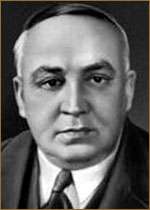Vladimir Gardin
| Vladimir Gardin | |
|---|---|
|
Vladimir Gardin | |
| Born |
Vladimir Rostislavovich Blagonravov 18 January 1877 Moscow, Russian Empire (now Russia) |
| Died |
28 May 1965 (aged 88) Leningrad, Soviet Union (now Saint Petersburg, Russia) |
| Occupation | Film director, screenwriter, actor |
| Years active | 1913–1965 |
Vladimir Rostislavovich Gardin (Russian: Влади́мир Ростисла́вович Га́рдин) (born Vladimir Rostislavovich Blagonravov (Благонра́вов); 18 January [O.S. 6 January] 1877 – 28 May 1965) was a pioneering Russian film director and actor who strove to raise the artistic level of Russian cinema.
He first gained renown as a stage actor in the adaptations of Russian classics by Vera Komissarzhevskaya and other directors. In 1913, he turned to cinema and started producing screen versions of great Russian fiction: Anna Karenina (1914), The Kreutzer Sonata (1914), Home of the Gentry (1914), War and Peace (1915, co-directed with Yakov Protazanov), and On the Eve (1915).
After the Russian Revolution of 1917, he organized and presided over the first film school in the world, now known as VGIK. With the advent of sound pictures, he stopped directing and returned to acting. His roles won him a high critical acclaim and the title of People's Artist of the USSR (1947). Gardin published two volumes of memoirs in 1949 and 1952. Another book, The Artist's Life and Labor, followed in 1960.
Selected filmography
- director
- The Keys to Happiness (1913); co-directed with Yakov Protazanov
- Days of Our Life (1914)
- Anna Karenina (1914)
- The Kreutzer Sonata (1914)
- War and Peace (1915)
- Petersburg Slums (1915); co-directed with Yakov Protazanov
- A Nest of Noblemen (1915)
- Ghosts (1915)
- Thought (1916)
- The Iron Heel (1919)
- Hunger... Hunger... Hunger (1921)
- Sickle and Hammer (1921)
- A Spectre Haunts Europe (1923)
- Locksmith and Chancellor (1923)
- Cross and Mauser (1925)
- Gold Reserves (1925)
- The Marriage of the Bear (1926)
- The Poet and the Tsar (1927)
- Kastus Kalinovskiy (1928)
